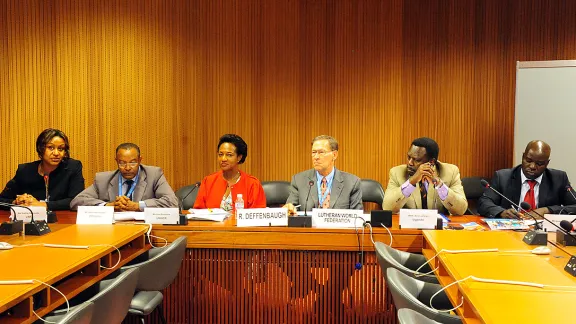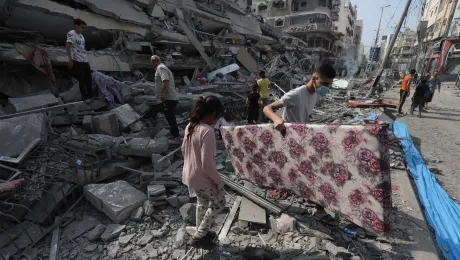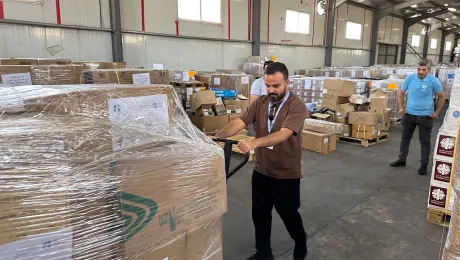
Panel discussion on rights of refugees in protracted situations. Photo: LWF/C. Kästner
LWF panel discusses rights of refugees in protracted East African crises
GENEVA, 28 September 2016 (LWI) – Protracted refugee situations confront humanitarian actors with additional demands, above and beyond immediate emergency relief. This was the consensus at a side event, “The rights of refugees and internally displaced people in the East and Horn of Africa” organized by The Lutheran World Federation (LWF) at the United Nations Human Rights Council.
The side event came a week after the New York Declaration for Refugees and Migrants was adopted by the United Nations, and asked what that declaration’s commitments will mean in practice for refugees and migrants who have sought refuge in the East and Horn of Africa. It lifted up good practices from Uganda and Ethiopia, as well as the ongoing challenges.
“Tremendously welcoming”
“Countries in the region have been remarkably and tremendously welcoming to people who had to flee,” said Ralston Deffenbaugh, LWF Assistant General Secretary for Human Rights and International Affairs. He cited recent UN reports which show Ethiopia is now hosting 744,000 refugees, closely followed by Uganda and Kenya, each with about half a million. The situation has strained the resources of host countries and aid agencies.
Ann Encontre, Deputy Director in the Region Bureau for Africa at the United Nations refugee agency, UNHCR, named donor fatigue, changing donor profiles and above all, the many crisis areas worldwide. “We at UNHCR and our partners are operating in an increasingly challenging donor environment."
“I am eternally grateful for those governments who are hosting people in the region, and for the New York declaration.” Howeer, to implement the declaration and adequately care for the displaced much more “human, financial and technical resources” are needed, Encontre concluded.
Question of resources and accountability
“These declarations are wonderful,” said Sophie Gebreyes, LWF Country Director in Ethiopia, “but how do we make sure they become a reality? Who holds the signatories accountable to make sure refugees get what they were promised?”
From the Ethiopian perspective, Chargé d’Affaires, Geremew Ayalew, underlined that refugees and asylum seekers have a right to be protected, not just under the well-settled international refugee law, but simply by the fact that they are human beings. He noted Ethiopia will be allowing more refugees to live outside camps and will be extending work permits, access to education, and land for refugees to till.
According to panelists from the Ethiopian and the Ugandan mission, the main weight of the refugee response is still carried by the host countries. “The government in Uganda established one of the most liberal refugee policies in the world,” said Ambassador Ben Lukwiya, deputy Permanent Representative of the Mission of Uganda.
“They did not stop at the emergency but provided long term development. Refugees are integrated into communities. They have access to the same services as a Ugandan, the right to work and to start their own business,” he continued. “But Uganda is already having a hard time taking care of its own people. The governments who provide shelter to refugees need more assistance.”
Education is key
This kind of emergency assistance has been necessary for more than 10 years. The protracted refugee situations, especially in the East and Horn of Africa region, call for different measures. ”Our main problem is the lack of durable solutions for all the refugees,” Gebreyes said.
Matendo Lokiru Yohana, LWF Regional Coordinator for East and the Horn of Africa, emphasized particularly the need to provide adequate education to displaced children, who make up more than 70% of the population in some settlements. ”We have seen generations lose out on education, who have not been to school because of the war. Humanitarian work has a tendency to focus on life-saving activities, leaving out education.”
At the same time, Yohana explained, education “has become a pull factor” to return home. “When people have the skills to rebuild, we have often seen that they want to go home.”
Change of perception
However, as the education example shows, protracted refugee situations also present humanitarian actors with a dilemma. While schools, vocational training, livelihoods and social cohesion projects aim to integrate refugees into their host communities in the best possible way, repatriation is still one of the main objectives of refugee work.
However, in protracted situations, this approach towards refugees might work no longer. “We must accept that refugees’ perception of identity may change as they put down roots in the new country,” Deffenbaugh concluded. “And it is a fundamental way of respecting the dignity of people to let them make that decision and to enable them to make a contribution to the country receiving them so generously.”


